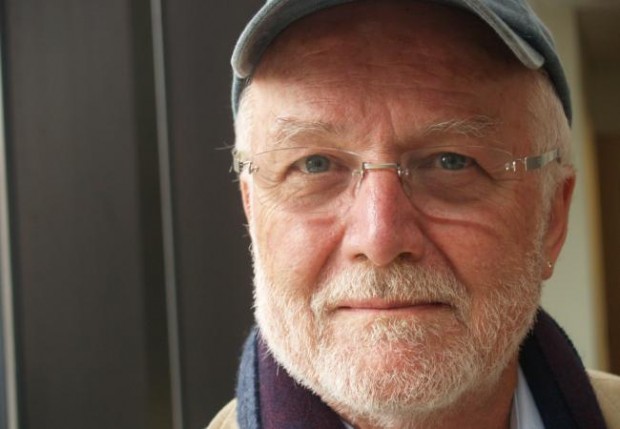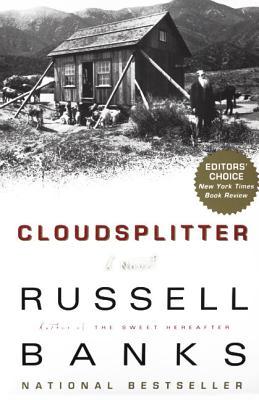
Guest contributor: Bill Lundgren
Lundgren’s Lounge: “Cloudsplitter,” by Russell Banks
categories: Cocktail Hour / Guest Columns / Reading Under the Influence
2 comments

Russell Banks
Upon recently finishing Cloudsplitter, by Russell Banks, I began to think about who are the best living American novelists. My reflections led to the Internet where, surprise, surprise, there were endless and varied lists. There was unanimity only regarding the upper echelon: Pynchon, Roth, and Morrison. Russell Bankswas nowhere to be found on any of these lists, an egregious and inexplicable omission.
Over a career spanning four decades, Russell Banks has produced a body of work startling in its diversity and relentless brilliance. After early short story collections he published Continental Drift, a Pulitzer nominated novel describing the sense of ennui and uprootedness in contemporary America. With Affliction and The Sweet Hereafter, both made into major motion pictures, he captured the claustrophobic xenophobia at the heart of New England culture more devastatingly than any writer since Hawthorne and with Rule of the Bone he offered a classic bildungsroman for the stoner age. More recently he published Under the Skin, a heartbreaking depiction of the way that contemporary America deals with an often unjustly marginalized underclass. But his masterpiece is Cloudsplitter, an historical novel depicting the life of the abolitionist John Brown as told by his son, Owen.
 The ill-fated raid on Harper’s Ferry in 1859 has been credited with forcing many Americans to stop straddling the fence on the issue of slavery, opening the path for the Civil War. In the aftermath of that raid, mainstream historians embarked upon a concerted re-imaging of John Brown. While Brown had previously been considered a hero by millions for his abolitionist stance, that hero image was problematical; after all, we can’t count among our heroes a man who tried to seize control of a federal armory as part of an attempt to foment a national slave rebellion. And so the propaganda machine went into overdrive, depicting John Brown as a terrorist and a madman, a rewriting of history that persists in many accounts to this day (this process is brilliantly recounted by historian James Loewen in Lies My Teacher Told Me).
The ill-fated raid on Harper’s Ferry in 1859 has been credited with forcing many Americans to stop straddling the fence on the issue of slavery, opening the path for the Civil War. In the aftermath of that raid, mainstream historians embarked upon a concerted re-imaging of John Brown. While Brown had previously been considered a hero by millions for his abolitionist stance, that hero image was problematical; after all, we can’t count among our heroes a man who tried to seize control of a federal armory as part of an attempt to foment a national slave rebellion. And so the propaganda machine went into overdrive, depicting John Brown as a terrorist and a madman, a rewriting of history that persists in many accounts to this day (this process is brilliantly recounted by historian James Loewen in Lies My Teacher Told Me).
The John Brown of Cloudsplitter however, is a man driven by the twin engines of religious fervor (which some would argue is a form of insanity) and a moral abhorrence of the institution of slavery. Our narrator, Brown’s third eldest son Owen, is not so much unreliable as unsettled, but as a narrative device to plumb the depths of his father’s enormously complex character, he offers the perfect perspective. Tortured by his own perceived shortcomings, Owen eventually comes to accept and embrace that his and his father’s destinies are irrevocably entwined. He argues fiercely and persuasively that his father was not insane; rather he was a man of uncompromising passion in an era when many preferred to pretend that compromise might yet staunch the bloodletting that seemed increasingly inevitable.
Banks portrays John Brown as a man concerned with doing what he perceived as morally right, while also being fully aware that his passions and practices placed him at odds with mainstream white society. As Banks said in a 1998 Paris Review interview: “I’m a white man in a white-dominated, racialized society; therefore, if I want to I can live my whole life in a racial fantasy. Most white Americans do just that. Because we can. In a color-defined society we are invited to think that white is not a color. We are invited to fantasize and we act accordingly.”
John Brown resisted that fantasy and Cloudsplitter masterfully recounts the power of that resistance, while displaying the prodigious gifts of one of America’s finest living novelists.

[Bill Lundgren is a writer and blogger, also a friend of Longfellow Books in Portland, Maine (“A Fiercely Independent Community Bookstore”), where you can buy this book and about a million others, from booksellers who care. Bill keeps a bird named Ruby, a blind pug named Pearl, and a couple of fine bird dogs, and teaches at Southern Maine Community College. ]

Another great review! Using John Brown’s third son as the storyteller reminded me of Leo Gorcey Jr’s memoir, “The Dead End Kid,” about his more famous Dad and his own destruction and alcoholism he had to overcome. I love your reviews, Bill, you always paint such broad pictures of the artist and their work!!!
Very interesting & thought-provoking.